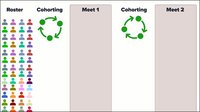At this point of the school year, initial plans have been partially, if not fully, implemented. Mere implementation, however, most definitely does not ensure desired impact. It is now incumbent upon administrators to monitor actively the key school initiatives; recognize successes and concerns; and, revise plans accordingly.
It is important to stress that some plans may well require some revisions, but schools should be very reluctant to abandon totally a previously agreed upon focus or routine. Successful schools led by impactful leaders routinely challenge past practices, which helps ensure everyone is focused and accountable. Conversely, struggling schools led by indecisive leaders routinely change past practices, which helps ensure everyone is frustrated and annoyed.
Any revisions to existing plans are triggered by the analysis of either quantitative or qualitative data. Quantitative data dominates most discussions as it is both easier to collect and easier to analyze. While it certainly has its place, the challenge with relying heavily on quantitative data is that it tends to be information rich, but insight poor. In other words, there is simply no substitution for principals routinely gathering both formal and informal qualitative data, to get a real sense of the success and sustainability of any new initiative.
A key aspect of meaningful monitoring is the willingness of all parties to give and receive focused feedback. The ultimate goal for a principal is to establish a culture in which staff are encouraged to reflect critically on their own practices, as well as freely share their honest views on the implementation of school and district initiatives. Having the principal actively involved in such discussions, greatly benefits the overall school, as well as enhancing the principal’s professional credibility. After all, encouraging this kind of frank, actionable discourse is the epitome of “walking the talk.”
This monitoring journey is an endless loop to heightened accountability. While each school will clearly have some specific foci, there are some general areas that must be closely monitored by every school principal.
#1 - School Climate
Principals must always keep a close eye on the “temperature” of the school.
Various surveys throughout the year provide principals with a good sense of what all stakeholders think of daily school life. Leaders must also engage in routine school and classroom walkthroughs, ongoing dialogue with staff members and students, and lots of keen observations.
The bottom line on monitoring school climate is the answers to three key questions: Do students feel safe? Do staff feel supported? Do parents feel heard?
#2 - Student Conduct
Student behavior plays a key role in establishing a positive and productive school climate.
All schools have a code of conduct, and it certainly needs to be shared with all stakeholders so that everyone is well aware of key sections. The far greater issue, however, is the commitment the principal and all staff members make to enforce consistently the expectations and consequences outlined in the document.
Student conduct covers a wide continuum from daily classroom interactions to egregious matters that may well require police involvement. Principals must have a measured, well-informed response to all of these situations, as well as monitor the present and future impact of such decisions on all parties involved.
#3 - Student Academics
The principal is the instructional learning leader in the school and is ultimately responsible for the accuracy and validity of all student assessment. All report card marks must be driven by objective standards, rather than by relative student rankings in any given class, grade, division or school.
Principals need to schedule regular academic “check ups” with classroom teachers and appropriate support personnel to ensure all students’ needs are being properly addressed. Another key aspect of this ongoing monitoring of students’ progress is to ensure parents are kept well informed of any significant learning challenges and the plan(s) to best address these concerns moving forward.
For students with special needs, principals have to work with staff to ensure all documented modifications are actually being implemented.
#4 - Budget Allocation
The principalship is clearly a multi-faceted role, and one key aspect is that of financial planner. Working with staff to prioritize school goals, and then allocating financial resources in a manner consistent with fulfilling these goals is fundamental to a productive principalship.
Any significant purchases must be consistent with the key foci outlined in the school plan. Principals must also ensure that school funds are spent equitably across the different divisions of the school and spent equitably throughout the duration of the school year.
Some funds can certainly be set aside for an agreed upon major purchase a few years down the road, but the vast majority of funds must be spent during the present school year. After all, it is only fair and reasonable that students presently attending the school benefit from funds allocated for this school year.
#5 - Teacher Appraisals
Principals evaluate all teachers on a scheduled appraisal cycle. It is important that these appraisals are not seen just as a “one off” by all parties involved. Through regular walkthroughs, ongoing professional dialogue in a variety of forums, and a commitment to regularly analyzing student data, principals should already have a clear sense of routine practices in every classroom.
At times, principals will need to engage teachers in challenging conversations regarding their routine instructional and assessment practices. The key is for principals to make their concerns clear in a respectful manner, and then carefully balance offering support and applying pressure.
Ignoring or enabling substandard work performance by a given teacher clearly fails students, but it also alienates other staff members who were previously committed to the school plan and to the principal. Having said that, proceeding with any significant corrective measures must be done discreetly and with the full support of the principal’s superiors, as this process can also become quite divisive among the greater staff.
About the authors
Jamie Bricker and Jack Barclay are retired school principals who live just outside of Toronto, Ontario. They co-host the Matters of Principal podcast.











